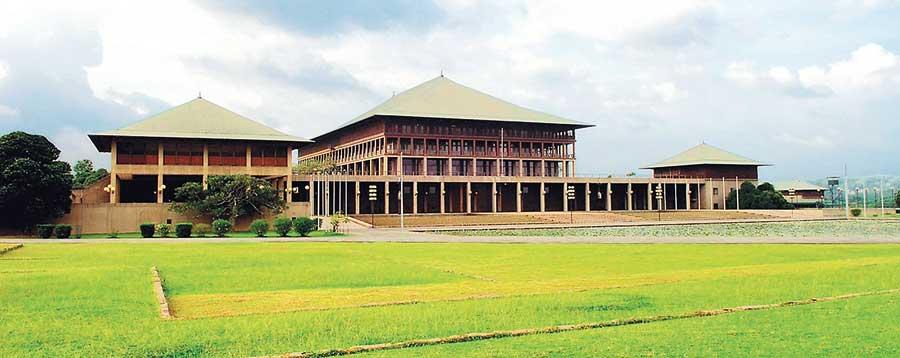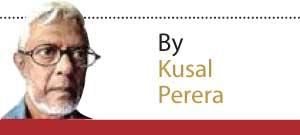17 Dec 2021 - {{hitsCtrl.values.hits}}

During the Budget 2022 debate in parliament concluded a week ago, PM Mahinda Rajapaksa responding to a query by the Opposition said the Constitution being drafted now, will be first discussed with all MPs before presenting in parliament. A few days before PM responded, Foreign Minister Prof. Peiris told parliament the draft Constitution would be presented in parliament around mid-January.
query by the Opposition said the Constitution being drafted now, will be first discussed with all MPs before presenting in parliament. A few days before PM responded, Foreign Minister Prof. Peiris told parliament the draft Constitution would be presented in parliament around mid-January.
Their announcements on behalf of the nine member “Expert Draft Committee” appointed with cabinet approval is proved manipulated by political leaders of the Government. Any independent Committee would make its own announcements to the public and to parliament. Would say, how the draft would be made into law, even if People are not called to participate in drafting.
"The two Republican Constitutions were argued as mandated by the People at elections in 1970 and 1977. The “mandate” actually was for one of the items in the “shopping list” offered for the vote at elections"
This therefore raises two major issues. First is how competent and capable the parliament is in deciding on a New Constitution for People. Second is the right, the role and the responsibility of People in Constitution making.
The right and responsibility of People in participating in Constitution making has never been accommodated here in Sri Lanka anytime in the history of independent Ceylon or after it was named the Republic of Sri Lanka. We have had three Constitutions, first the Soulbury Constitution in 1947, thereafter the first Republican Constitution in 1972 and then the present Constitution with the Executive Presidency called the second Republican Constitution promulgated in 1978.
Mandates without People
The first Constitution adopted in 1947 was negotiated between few Ceylonese who represented the Colombo elite and the British post WW II leaders for “Dominion Status” within the British empire. It was those who negotiated for independence who decided and compromised on the provisions included in the Constitution. “People of Ceylon” certainly had nothing to do with independence, nor with the Constitution.
The two Republican Constitutions were argued as mandated by the People at elections in 1970 and 1977. The “mandate” actually was for one of the items in the “shopping list” offered for the vote at elections. That promise did not even have the basics of the “new”
Constitution offered.
Not only the three Constitutions, even Amendments to Constitutions were not asked for by the People, except the 17 Amendment. All other Amendments were by Government leaders, most not even discussed within parliamentary groups and some merely approved by the Cabinet. The 17 Amendment was the result of urban professional groups looking for a remedy whilst discussing heavy politicisation of the State in late 1990s.
There were also three other efforts in making a new Constitution for Sri Lanka, during the past two plus decades. First in August 2000 was under President Kumaratunge. She had it written under her supervision by a small group led by Neelan Thiruchelvam. With UNP and the TULF in the Opposition vehemently opposing it and two senior ministers Ratnasiri Wickramanayake and Mahinda Rajapaksa making it clear they do not endorse it, that effort was simply dropped.
The second initiative was by President Mahinda Rajapaksa who called for an “All Party Conference” in 2006 and established an All Party Representative Committee (APRC) in July the same year for uninterrupted discussions to negotiate a “homegrown solution” to the National Question within a new constitution. President MR appointed an “expert committee” too to assist the APRC. This initiative with 128 sessions held in about two years, wrote a “Final Report” that included 21 Chapters endorsed by 15 political parties that excluded the TNA and the UNP. President Rajapaksa had his own reason for keeping the TNA to “discuss the final homegrown solution that all others agree upon is ready”. The JVP ran away halfway through discussions on a flimsy excuse that only spelt their “sectarianism”.
"Not only the three Constitutions, even Amendments to Constitutions were not asked for by the People, except the 17 Amendment"
Sadly, this APRC Final Report endorsed by L.S.S.P, S.L.F.P, U.N.P (Democratic Group), the CP of SL, C.W.C, S.L.M.C, N.U.A, J.H.U, M.E.P, Upcountry People’s Front, All Island Muslim Congress, National Congress, W.P.F, E.P.D.P and T.M.V.P was not officially made public. Importance of this Final Report that provides a framework for an inclusive State with power sharing is that it gained acceptance among diverse political opinion as the name list above prove.
The third failed effort was by the “Yahapalana” government led by the UNP. This too had no space for people’s participation, though former Sama Samajist Senior Lawyer Lal Wijenayake was appointed as head of a committee to collect ideas and proposals from the public. It was basically a “courier agency”. The “Yahapalana” government had no “political will” to deliver on the promise.
People’s participation proper
This present Rajapaksa government too is working on a New Constitution with an “Expert Committee”. It requested people to send in ideas and proposals to the Committee. This in every aspect resembles the “Yahapalana” decision in creating a new constitution.
A Constitution is for all the people in society. It is not for those who voted them to power. Drafting of a new Constitution is the right and the responsibility of all 15 million registered voters and not that of the 6.9 million who voted them to power. It requires a democratic process. In short, a democratic constitution cannot be created outside of a democratic process.
In this modern world, there are many instances where mass movements consciously participated in creating a constitution for the People. In almost all, political leadership in power created space and mechanisms for such people’s participation as their responsibility towards a democratic society.
Much have been spoken, written, discussed and researched about the South African experience in drafting and promulgating an inclusive, democratic constitution for a free, post-apartheid society. Bishop Desmond Tutu was quoted as saying their constitution was drafted by 30 million people.
Ugandan and Brazilian experiences of creating new constitutions in 1988 are also spoken of as people-centred processes. It is said people participated in discussing the first and the last drafts, before they were adopted by legislatures and made into law. In Eritrea where literacy was very low, they used the radio to discuss the importance of making a new constitution and in engaging with the people. Poetry and song, playlets and debates were organised to create community forums to discuss constitutional provisions. In Kenya when they decided to improve their constitution, the Kenyan Constitutional Committee officially announced the purpose of redrafting the constitution is to “create a constitution owned by the People” that by norm required people’s participation in open forums across society.
Most recent phenomenon that drew heavy attention from academics, researchers and the media from across the globe, was the drafting process of a constitution that began in 2016 to establish Mexico City as autonomous. While there were usual discussions, meetings, debates and lobbying for proposals, popular internet platform “Change.org” provided a special “online public petition” platform for Mexico City residents to canvass support for their proposals. The municipal council provided free internet service to all city residents with 300 internet kiosks established across the city.
Important features in this very dynamic citizen-centred process were that it began with the appointment of a 28 member drafting committee which included artistes, professionals, ex-Mayors, academics, social activists from Mexico City residents. The Constitutional Council established to promulgate the Constitution was established with city residents electing 60 out of 100 of its members. The most interesting and also a very valid condition was that every nomination had to have the consent of 10,000 permanent residents of the city. Rest were nominated by the sitting mayor and by the President.
When the constitution was finally promulgated in September 2018, in a city of about nine million permanent residents, its people had submitted 341 proposals through the exclusive platform Change.org provided totalling over 400,000 signatories. The constitution included 14 articles from public petitions. UN accepted this highly participatory, extremely democratic process led to a “historical document that addresses the central challenges of development and peace” and as “a guide to fulfill the universal, indivisible and progressive nature of human rights.”
Are we anywhere near “democracy”?
We are no match to such a democratic, participatory process in creating our Constitution if it does come out as promised by government leaders. There is none in government who could say how many people’s proposals have been received by their “Expert Committee” and what they are. Even if the numbers are big, we would end up with a draft the Expert Committee would provide for this parliament to adopt.
How competent is this parliament to debate and adopt a “decent” constitution? First, this is no “decent” parliament to debate a constitution with discipline. MPs know no discipline even in how they use their “mother tongue”. Their brawls the Speaker has no control have even spilled over to the common lobby. Language is what is heard in the gutters. This violent culture has been growing through decades without any political leadership disciplining their members within the party organisation.
In a rowdy collective, there obviously cannot be any intellect as shown during the recently concluded Budget debate. There was no in-depth analysis other than arguing for IMF loans and about debts. None showed any semblance of a future vision. There was no contribution worth even a casual read.
Debating a constitution as supreme law of the country requires far more intellect than reading out statistics and condemning corruption. Requires a visionary outlook and an obsessive belief in democracy. Decline is such, we now have to leave parliament and reach out to People in a “Referendum” to promulgate a new constitution.
28 Nov 2024 30 minute ago
28 Nov 2024 33 minute ago
28 Nov 2024 48 minute ago
28 Nov 2024 2 hours ago
28 Nov 2024 2 hours ago